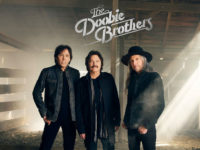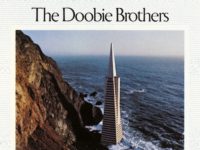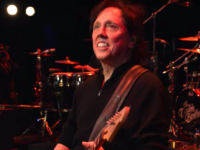In a time when album rock took over the radio airwaves, the Doobie Brothers was a mainstream group that still acted like more of a singles band. I haven’t checked, but I’d bet a stack of Franklins that The Best of the Doobie Brothers is still far and away their best-selling album (and that record didn’t even include most of the Michael McDonald hits). But being a singles band obscured the fact that in their prime, they had lots of great album cuts with little filler.
What Doobie Brothers aficionados would call “prime” depends on their preference of Tom Johnston or the aforementioned McDonald, but it sure seemed they were a constant hit factory from “Jesus Is Just Alright” up through “Takin’ It To The Streets,” The Captain and Me, from 1973, is the Doobie Brothers’ best release from that prime era, as solid of a MOR rock album as there ever was.
As tempting as it is to gush all over The Captain & Me, let’s turn the spotlight on their only slightly weaker follow-up, which arrived in February 1974.
What Were Once Vices Are Now Habits is one of those records I became very familiar with growing up and still sounds great decades later. This record encapsulates all that many people liked about the pre-McDonald Doobies Brothers: an accessible mixture of boogie rock, country, soul, jazz and R&B. Tight, top-notch musicianship. And strong, varied songs, contributed primarily by either Tom Johnston or fellow guitarist/vocalist Patrick Simmons.
For those not familiar this record, the first question might be, what hits did it spin off? The record label had intended for Johnston’s soulful, melancholy “Another Park, Another Sunday” to be it, but DJs around America soon flipped the single over and played Simmons’ swampy backwoods ditty “Black Water” instead, becoming the Doobie Brothers’ unlikely first-ever charttopper.
Maybe it’s because the charm of “Black Water” had long worn off on me due to saturation, but I favor “Another Park, Another Sunday” and think it remains one of Johnston’s strongest compositions ever. His Stax-style “Eyes of Silver,” featuring the Memphis Horns, was another crack at the pop charts, but fell short. A shame, because it contains some of the Doobie Brothers’ distinct ensemble rhythm guitar playing and some fine vocal harmonies.
Among the single-less tracks, in fact, are some real Doobie Brothers gems: “You Can’t Stop It” boasts a real funky shuffle and bass player Tiran Porter, a criminally underrated bassist, propels the rhythm in perfect sync with the band’s two percussionists Keith Knudsen and John Hartman.
It’s followed by another Patrick Simmons-penned nugget, the mellow, soulful “Tell Me What You Want (And I’ll Give You What You Need)”. (That’s soon-to-be-full-member Skunk Baxter providing the pedal steel on the final chorus.) Patrick Simmons’ full set of stellar tunes is completed by his vaguely progressive, empyreal “Daughters of the Sea,” and it shows off a depth in his songwriting not often seen in later years.
The Tom Johnston partisans like this version of the Doobie Brothers because they could rock more convincingly, and What Were Once Vices Are Now Habits doesn’t disappoint with Johnston numbers like “Road Angel” and “Down in the Track.” His “Pursuit on 53rd St.” picks up where “China Grove” left off. Tom Johnston’s “Spirit,” which has a melody that sounds like a close cousin of “Eyes of Silver,” shows off band’s bluegrass side without losing any of its soul.
Maybe this album won’t ever be put alongside the widely acknowledged rock classics of that time like Pink Floyd’s Dark Side of the Moon, Fleetwood Mac’s Rumours or Steely Dan’s Aja. It’s just a consistently good-to-great, entertaining album by a successful mainstream rock band hitting its stride. If that’s the kind of forgotten treasure you’re looking for, you’d want to know about the Doobie Brothers’ What Were Once Vices Are Now Habits. There’s gold between them there hits.
- Tomeka Reid Quartet – ‘3+3’ (2024) - April 30, 2024
- Claudio Scolari Project – ‘Opera 8’ (2024) - April 25, 2024
- Nick Millevoi – ‘Moon Pulses’ (2024) - April 23, 2024




